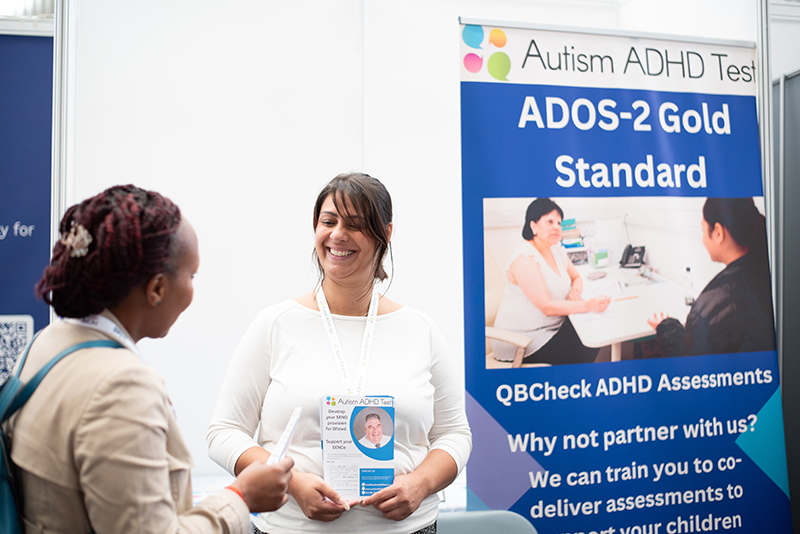Assessment for ASD,using ADOS-2 gold standard and ADHD QBCheck
(Autism Spectrum Disorder and Attention Deficit Hyperactivity Disorder)
Follow-up counselling session with a qualified therapist
Autism Spectrum Disorder(ASD)
Remember, whilst some people are diagnosed as children with autism (ASD), this is not true for all. Many people will only notice that they don’t ‘fit in’ or have certain autistic traits as they start to get older, and an assessment can be very helpful in these cases.
Symptoms of autism usually start in early childhood and persist into adulthood, although the way in which these symptoms present themselves can change as a person gets older.
Identification and initial assessment of possible autism
Be aware that people in the following groups may have an increased likelihood of having ADHD compared with the general population.
Assessment for autism may be considered when a person displays one or more of the following:
- Persistent difficulties in social interaction
- Persistent difficulties in social communication
Stereotypic (rigid and repetitive) behaviours, resistance to change or restricted interests, and one or more of the following:
- Problems in obtaining or sustaining employment or education
- Difficulties in initiating or sustaining social relationships
- Previous or current contact with mental health or learning disability services
- A history of a neurodevelopmental condition (including learning disabilities and ADHD), or a mental disorder


Assessment pathway for Autism (ASD) using the ADOS-2 gold standard
- Initial telephone consultation we will include the NHS screening tool, using the AQ-10 (Autism Spectrum Quotient) assessment (for adults with suspected autism who do not have a learning disability) to find out if you suitable for an Autism assessment.
- Appointment of a clinical co-ordinator to guide you through the process
- Completion of parent/teacher/self-assessment forms
- Autism Diagnostic Observation Schedule (ADOS 2) – the gold standard for assessing autism
- Additional multidisciplinary team assessment, including cognitive screening.
- Summary discussion with the multi-disciplinary team
- Production of the assessment report
- Scheduling of a feedback appointment with links to relevant sources of support
- Follow-up counselling session with a qualified therapist
Attention Deficit Hyperactivity Disorder(ADHD)
Recognition, identification, and referral for ADHD, using QB Check
Why an ADHD assessment can help you or your child
- You can access support following a professional assessment
- Children and young people can access an education health care plan (EHCP)
- Children and young people can apply for disability living allowance (DLA)
- An ADHD assessment will allow you to understand reasons for your behaviour and actions
- You can discuss with your GP if medication may be an option to consider
- You can explore the support available in your area
- We utilise the QB check system to help with your assessment


Assessment pathway for Attention deficit hyperactivity disorder (ADHD)
- Initial telephone consultation
- Appointment of a clinical co-ordinator to guide you through the process
- QB Check computer assessment and appropriate psychological screening tools eg Conners’ Adult ADHD Rating Scale (CAARS) and, in line with NICE guidance, we also include an assessment of the person’s needs, co-existing conditions, social, familial and educational or occupational circumstances, and physical health
- Summary discussion with the multi-disciplinary team
- Production of the assessment report
- Scheduling of a feedback appointment with links to relevant sources of support
- Follow-up counselling session with a qualified therapist
Also, be aware that ADHD is thought to be under-recognised in girls and women and that:
- they are less likely to be referred for assessment for ADHD
- they may be more likely to have undiagnosed ADHD
- they may be more likely to receive an incorrect diagnosis of another mental health or neurodevelopmental condition
Dyslexia Assessment
- The Tests of Dyslexia (TOD™) is the first comprehensive assessment of dyslexia, eliminating the need for multiple assessments. The TOD quickly identifies those at risk for dyslexia and informs the assessment process, and provides a comprehensive diagnostic assessment aligned with evidence-based interventions and recommendations.
- Suitable for all ages from 5 years, the TOD offers age and year-based tests, indexes and composite scores.
- Specifically designed to include those other conditions such as autism and ADHD, and learning disability as well as the general population.
- The assessment report included specific strategies and interventions developed from your assessment.

In accordance with NICE guidelines, following every assessment undertaken for ADHD, and for those over 6yrs+, we can use the QB check screening to support our assessment. We hold a structured discussion with the individual (and their families or carers, as appropriate) about how ADHD could potentially affect their life.
NICE recognises that rating scales such as CAARS and the Strengths and Difficulties Questionnaire are valuable additions to the formal assessment process. Equally, observations undertaken of the individual in other settings (for example, at school) can be useful in providing a wider evaluation of the potential impact of ADHD in other areas of their life.

What the assessment involves
We carry out face to face assessments in Birmingham. We are also able to offer a home visiting assessment service.
Your assessment will include:
√ A full and comprehensive ADHD assessment conducted in line with the current NICE recommended guidelines
√ Discussion of your results with our multidisciplinary team
